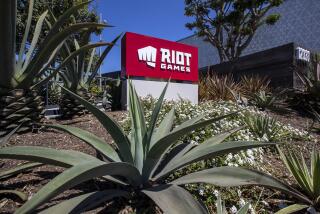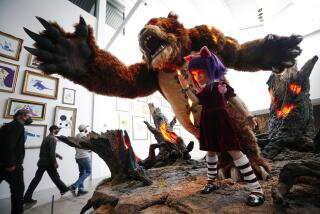Danny Bilson aims for turnaround at THQ with video game Homefront
As a small child, Danny Bilson played with rubber prop guns on the set of “Hogan’s Heroes” and “The Andy Griffith Show” while his father directed episodes. Forty-five years later, Bilson is still playing games in Hollywood, but now hundreds of millions of dollars are at stake.
As executive vice president of core games at THQ Inc., the 54-year-old former screenwriter is overseeing a business upon which the Agoura Hills video game publisher has staked its future. Once known for lightweight game adaptations of movies and TV shows such as “Cars” and “SpongeBob SquarePants” and World Wrestling Entertainment smackdowns, THQ is responding to market trends and a flagging stock price by transforming itself into a publisher of big-budget action titles.
On Tuesday, it releases Homefront, an ambitious action game about America under North Korean occupation that’s the first original project to be developed under Bilson. The game’s fate will be a measure of the wisdom of THQ’s decision to spurn veteran game industry marketers and product managers and put its fate in the hands of an executive whose professional achievements include screenwriting credits for “The Rocketeer” and the TV show “The Flash.”
“I’m bringing a totally new culture for this company,” Bilson said. “We’re not making manifolds. We’re making products to entertain people.”
With production costs of $35 million to $50 million and tens of millions more to advertise, Homefront is the most expensive video game THQ has produced. The company must sell 2 million copies just to break even, a company executive said.
That won’t be easy. The video game market is flooded with similar “shooter” games from Activision Blizzard Inc., Electronic Arts Inc. and Sony Corp., all chasing the same young male gamers who spend their bottom dollar on food, rent and video games — not necessarily in that order.
It’s a demographic Bilson knows well. When he wasn’t hanging out on set with his childhood friend Ron Howard, young Danny was home playing board games. When Bilson turned 21, his father gave him an Atari 2600 game console. “I went crazy,” Bilson recalled.
Bilson followed in the footsteps of his father, Bruce Bilson, and his grandfather, the late Hollywood film producer George Bilson, and became a scriptwriter. Then a chance meeting on a plane in 1997 changed his trajectory. The man in the seat next to him was Don Mattrick, the head of studios at EA who is now chief of Microsoft Corp.’s Xbox business.
“For me, getting to meet someone from EA was like someone at EA getting to meet someone from Hollywood,” Bilson said. “I was such a fanboy.”
Mattrick persuaded Bilson to become a consultant on several EA titles, including the Sims. “He’s extremely insightful about game design,” said Bing Gordon, who was Bilson’s boss at EA and is now a venture capitalist.
Yet Bilson’s business acumen remains unproven. An attempt to start his own game studio in 2004 failed, forcing him to return to writing scripts and comic books. In 2007, he got a call from THQ asking if he wanted to run the company’s “core” game business, overseeing production and, soon, marketing as well.
Bilson appears to relish his outsider status. In an industry where people rarely disparage rivals, Bilson isn’t reluctant to offer blunt assessments. “I admire what Activision does, but where is their new content? Why don’t they innovate?” he said of the nation’s largest publisher.
Bilson notes that in an industry preoccupied with “franchises,” half of the games in development at THQ are original properties (a strategy made easier given THQ’s shortage of sequel-worthy brands).
“In some ways I’m taking us back to Hollywood in the ‘70s when it’s about the artist and the content comes first before the marketing,” he said.
Since THQ’s founding in 1991, licenses from well-known properties helped it become a mid-sized publisher. By 2008, however, sales of licensed games began to decline as more-sophisticated players demanded higher-quality titles.
By the end of that year, Chief Executive Brian Farrell announced a shift in strategy to cut costs and shift focus to “core” games, a move that elevated Bilson’s role.
Some early efforts, such as the Grand Theft Auto-like Saints Row series, have been solid performers, and the company’s financial results have improved, though it still expects to be in the red for the current fiscal year.
“We have de-emphasized the kids’ business and had a very dramatic turnaround, but what we haven’t done yet is broken out with a 5-million-plus-unit seller,” Farrell said.
The company is releasing seven “core” games between February and June alone, compared with four in all of 2010. It’s widely speculated that Farrell is seeking to position THQ to be sold. A company reliant on licenses that will expire is not an attractive acquisition target, but one with several popular titles with sequel potential would be. Farrell dismissed talk of an acquisition as “premature.”
“The only thing I care about is driving the value of the company,” he said. “We’re in the midst of a very dramatic turnaround.”
Colin Sebastian, an analyst with Lazard Capital Markets, said, “If THQ can come up with a couple of franchises that sell well, that’s a much clearer path to profitability and a higher stock price.” On the eve of Homefront’s release, THQ’s stock jumped 36 cents, more than 6%, to $5.94. That’s down from more than $36 in 2007, but up from a low of $2.24 in 2009.
In Homefront, which has a story by “Red Dawn” screenwriter John Milius, players control a guerrilla fighter in a dystopian 2027 who combats the occupying forces. The online multi-player format, which many gamers consider more important than the story, allows up to 32 people to do battle as Americans and North Koreans.
In addition to advertising on Comedy Central, NCAA basketball broadcasts and billboards blanketing big cities, THQ has aggressively courted the video game press. Chris Grant, editor of the AOL-owned blog Joystiq, said the publisher has been trying not only to promote Homefront but also to overcome fans’ skepticism.
“In a short amount of time they have done an impressive job of reversing a brand that many gamers previously considered poisonous,” he said.
And that, just as much as games flying off shelves, is what THQ expects from the former scriptwriter.
“I was very deliberate in asking Danny to take this position,” Farrell said. “The perception of THQ is going to change from a boring kids’ license company to an oh-my-[expletive]-God video game company.”






